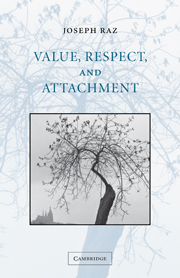Introduction
Published online by Cambridge University Press: 04 December 2009
Summary
There is not much in ethical theory which is not widely disputed. One view which enjoys wide support is that values are universal. Nevertheless, it appeared to me that there are uncertainties regarding the meaning and scope of that view which could benefit from further reflection. When invited to give the Seeley lectures of 2000 I decided to use the occasion for yet another, partial and incomplete, reflection on some of the contours of the view that values are universal. I wanted to understand better the significance of this view, and its limits. In particular, I wanted to improve my understanding of how it is compatible with the thought, controverted by many, but compelling to me, that evaluative properties, that is, properties which in themselves make their possessors better or worse, are historically or socially dependent. Social practices are contingent, and changes in them are contingent. If the evaluative depends on the contingent can it be universal? This seemed an appropriate theme for a series of lectures dedicated to the memory of a historian interested in theory and in philosophy, who brought theory to the study of politics and history at Cambridge.
I am aware more of what I did not manage to discuss, or discussed all too briefly and dogmatically, than of what the following pages accomplish. They are very one-sided and partial. Their focus is the tension between partiality and impartiality. Universality seems to imply impartiality.
- Type
- Chapter
- Information
- Value, Respect, and Attachment , pp. 1 - 9Publisher: Cambridge University PressPrint publication year: 2001

